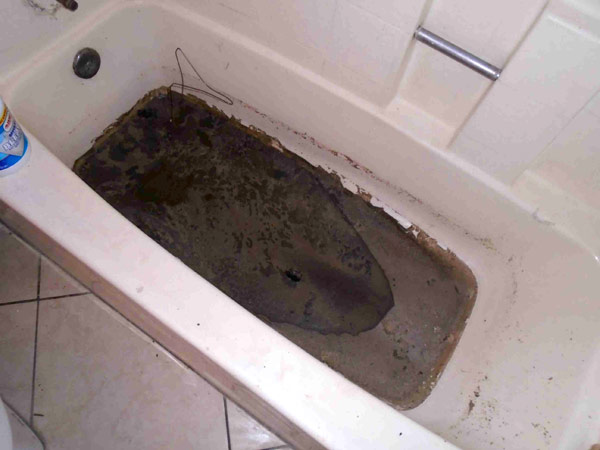The Definitive Answer: Effluent Coming Up Through the Bathtub
The Definitive Answer: Effluent Coming Up Through the Bathtub
Blog Article
We have stumbled on this post relating to What to Do if Sewage Starts Coming Up Through Your Bathtub directly below on the internet and concluded it made sense to write about it with you on my blog.

Sewer back-up in the bath tub can be a traumatic and unhygienic issue for any kind of home owner. Not only is it troublesome, yet it also positions major health and wellness dangers and shows underlying concerns with the plumbing system. Recognizing why sewer is turning up via the bath tub is critical for taking appropriate action to deal with the issue efficiently.
Introduction to the Issue
Usual Factors for Sewer Backup
Clogs in the Sewage System Line
One of one of the most typical root causes of sewage backup is a clog in the sewage system line. This can occur because of the buildup of debris, grease, or foreign items in the pipelines, protecting against appropriate flow and creating sewer to back up into your bath tub.
Tree Root Intrusion
Tree roots seeking moisture and nutrients can penetrate drain lines via tiny splits or joints. In time, these roots can grow and broaden, triggering substantial damage to the pipes and bring about sewage backup problems.
Comprehending the Issue
When sewage starts backing up right into the tub, it's a clear sign of a trouble with the drain system. The wastewater that must be streaming far from your home is rather discovering its back right into your space, which can result in substantial damage and carcinogen.
Prospective Reasons
Numerous aspects can add to sewer backup in the tub. From obstructions in the drain line to issues with the plumbing infrastructure, identifying the origin is important for finding an option.
Aging Facilities
Older homes may have outdated plumbing systems that are a lot more susceptible to deterioration, splits, and degeneration. As pipes age, they become much more prone to leaks and blockages, raising the possibility of sewer back-up cases.
Heavy Rainfall or Flooding
During durations of heavy rainfall or flooding, the drain system might come to be overwhelmed with excess water, triggering back-ups and overflows. This can cause sewage supporting into bathtubs and other fixtures inside the home.
Signs of Sewage Back-up
Foul Odors
Undesirable smells originating from drains pipes or components, particularly in the bathroom, may indicate sewer back-up problems. These odors are typically solid and persistent, signifying an issue that needs immediate attention.
Slow Draining Fixtures
Tubs, sinks, and toilets that drain pipes gradually or otherwise whatsoever could be experiencing sewer back-up. If several components are affected simultaneously, it's most likely that the problem stems from a typical point, such as the primary sewage system line.
Gurgling Noises
Weird gurgling or bubbling noises originating from drains pipes when water is running elsewhere in your home are a measure of air entraped in the plumbing system. This air buildup can result from sewage back-up and need to be examined immediately.
Health Threats Connected With Sewer Back-up
Contamination of Supply Of Water
Sewage backup can pollute the water supply in your house, presenting a major wellness threat to you and your family members. Exposure to infected water can result in intestinal issues, skin infections, and various other ailments.
Mold Growth
Dampness from sewer backup can produce perfect conditions for mold and mildew growth in your house. Mold spores can aggravate respiratory troubles and cause allergic reactions in delicate people, making timely clean-up vital.
Spread of Illness
Sewage consists of damaging microorganisms, viruses, and parasites that can cause a variety of diseases, including liver disease, cholera, and gastroenteritis. Coming into contact with sewage or contaminated surface areas places you at risk of infection.
Tidying up After Sewer Backup
Sanitation Procedures
Completely decontaminate and sterilize affected locations after sewer back-up to eliminate hazardous microorganisms and prevent mold and mildew development. Usage proper cleansing items and safety equipment to make certain safe and effective clean-up.
Repair of Influenced Areas
Fix any type of damages to floor covering, walls, or components caused by sewer back-up. Depending on the level of the damages, you may require to replace carpets, drywall, or other products to recover your home to its pre-loss problem.
Immediate Actions to Take
Turning Off Water System
In the event of sewage back-up, it's essential to switch off the water to stop more contamination and damage. Situate the major water shutoff valve in your home and shut it off up until the issue can be solved.
Speaking To a Specialist Plumber
Managing sewer backup is not a DIY work. Call a qualified plumber with experience in managing sewage-related concerns to evaluate the circumstance and execute essential repair services or cleanups.
Avoiding Contact with Polluted Water
Until the sewage back-up is dealt with, avoid contact with infected water to prevent the spread of germs and virus. Put on safety gear if you need to remain in the affected location and wash your hands completely afterward.
Preventive Measures
Routine Maintenance of Sewage System Lines
Arrange normal examinations and upkeep of your sewage system lines to recognize and attend to potential problems before they intensify into significant problems. This can consist of clearing out particles, checking for tree root invasion, and repairing any kind of damaged pipelines.
Mounting Backwater Shutoffs
Take into consideration setting up backwater shutoffs in your plumbing system to prevent sewage from flowing back into your home during durations of heavy rainfall or flooding. These valves immediately close when water draws back up, securing your residential property from contamination.
Appropriate Disposal of Home Waste
Stay clear of flushing anything besides toilet paper and human waste down the bathroom to avoid blockages and blockages in the sewer line. Dispose of oil, oil, and various other family chemicals appropriately to lessen the risk of plumbing troubles.
Why is There Sewage Coming Up Through the Bathtub
Sewage in your bathtub is a major problem that can make you want to abandon the bathroom for good. You don’t have to. However, it is important to identify the source of the issue and take the necessary steps to resolve it in order to avoid any health risks and property damage. In this article, we will discuss what could be causing sewage to back up through your bathtub so you can take action quickly and effectively.
The Main Reason For Sewage Backup in The Bathtub
All the sinks and toilets in your home connect to different pipes that lead to the main sewer line. The sewer line then connects to the municipal sewer system. This connection works seamlessly on a daily basis, but there can sometimes be a problem with the main sewer line.
The most common cause of sewage backup is a clogged or blocked main sewer line. The main sewer line can be clogged due to the accumulation of debris, tree roots or grease buildup, or other materials. Another possible cause is a collapsed pipe. When this happens, your toilets and sinks won’t be able to drain properly. This is when sewage starts backing up through the bathtub. If the problem has been occurring for some time now, it might be time to consult with a plumber as there may be more severe damage that needs fixing.
How Can You Tell if it’s Coming From Your Sewer Line?
If you’re experiencing a sewage backup in your bathtub, then you can use a few simple methods to determine if it is coming from the main sewer line. First, try to unclog the tub drain with a plunger or an auger and see if that helps. If not, then inspect all of the drains in your house and check if there is any blockage in them. If some of the other drains are not working fine, then it’s likely the problem is with your main sewer line.
Common Signs of a Clogged Main Sewer Line
If you suspect that your main sewer line is blocked, then there are a few common signs to look out for. Frequent clogs in your home are a sure sign of a clogged sewer line. You can also check for slow drainage from all the plumbing fixtures.
Slow Drains
If you notice that it takes longer for your sinks and toilets to drain, then this could be a sign of a clogged main sewer line.
Frequent Clogs
Another common sign is that your drains or toilets become clogged almost all of the time. If this happens, then it could be a sign that the main sewer line is blocked.
Water Backup
Do you notice water or sewage coming back up from any of the drains in your home? If your answer is yes, you may have a clogged main sewer line.
Sinkholes
If you’ve noticed sinkholes in your yard or overflowing sewage from the ground, you may be facing a blocked sewer line issue.
Your Shower or Sink Makes Gurgling Noises
Have you noticed gurgling noises coming from your sink or shower lately? These are typically signs of a blocked sewer line and should be checked out immediately.
How to Prevent a Main Sewer Line Clog
Once you’ve identified that your main sewer line is clogged, it’s important to take steps to prevent it from happening again. The best way to do this is to avoid putting any solid material that can clog the drain, such as grease and other debris. You should also be mindful of what you flush down your toilet. In addition, you should schedule regular maintenance for your main sewer line. This will help keep it clear and free from clogs or backups.
What Should You do if You Notice Sewage Backing up Through The Bathtub?
If you’ve noticed sewage backing up through the bathtub, then it is important to call a professional plumber immediately. A plumber can inspect the situation and determine what the cause is, such as a blocked main sewer line. They will also be able to advise you on how best to fix the issue. In some cases, a simple drain cleaning may be all that is needed.
However, if the blockage is severe, then your plumber may need to use more advanced methods to clear the blockage.
No matter what, it is important to always call a professional plumber if you experience any kind of sewage backup. They will be able to assess the situation and provide you with a solution that is best for your home.
https://baylorinc.com/blog/why-is-there-sewage-coming-up-through-the-bathtub/

As an avid reader about Why sewage is coming up through your bathtub, I think sharing that segment was really useful. Liked our blog posting? Please quickly share it. Help another person discover it. We thank you for your readership.
Click Here
Report this page